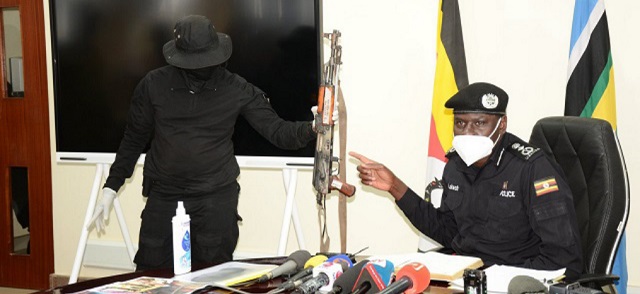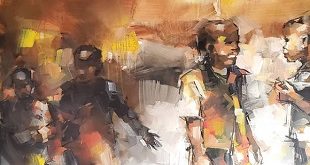
Enter Lokech
The entry of Lokech into Kampala’s political battles was meant to hammer the opposition led by red army of the National Unity Platform (NUP) with the ruthlessness of hunting down terrorists on the scale of Al Shabaab or military gangs in South Sudan.
“Anyone who cannot defend the people should go home and rear goats,” Museveni said after sacking Sabiiti and replacing him with Lokech.
Sabiiti, younger than Lokech, was another fast rising army officer. He had a short stint as Commander of Military Police before Museveni elevated him in March 2018 to work as the deputy Police chief. The President’s frustrations with the police however remained.
In appointing Lokech, Museveni might have felt that he had finally solved his Police problem.
The lanky Lokech looked set for the four star General pip in less than ten years going by his exploits. When he took over at Police, Lokech assumed a position that many people look at as a sign of scaling the ranks- both militarily and politically.
Known as ‘The Lion of Mogadishu’ for his stints as a fierce commando fighting the notorious Al Shabaab in the sandy capital of Somalia, Lokech was thrust in new terrain. His most marked actions as the Deputy IGP was when he personally took over the investigation into the attempted assassination of Works Minister Gen. Katumba Wamala.
Wamala was shot by assassins riding on motorbikes on June 1 in Kisaasi, a Kampala suburb, as he drove to work. His daughter, Brenda Wamala, and driver Haruna Kayondo, were killed on the spot. On July 1, Lokech dressed in his pitch black uniform gave a high profile update on his hunt for the alleged assassins.
Lokech commandeered the surveillance operation and manhunt in pockets of Kampala that stretched over three weeks after the attack. It resulted into the arrest of four suspects and some were killed prompting criticisms as an abuse of due process. However for Lokech, it was a move to mark his imprint on the force. Displaying guns allegedly used in the attack on Gen. Katumba, he temporarily snatched positive news coverage for the police that has habitually muddled up investigations.
Also as commander of the police, Lokech oversaw a terrifying turn of events in Uganda where police kidnapped and tortured thousands of youth who were supporting Bobi Wine in the 2021 elections.
It was a dark time and the worst post-election period in Uganda. With sanctions looming on Uganda’s security honchos, it was telling what three more years of Lokech as deputy IGP had in store for him.
Kayihura’s ghosts
For President Museveni, fighting political wars on his behalf has always been a key performance indicator for the police. Kayihura laid the groundwork for this by buying off ring leaders among the ever bulging numbers of anti-government youth in Kampala. Kayihura also allied himself with criminal groups like Boda Boda 2010 which was implicated in murders and other forms of violent crime in Uganda.
In crushing walk to work protests, curtailing the movements of former presidential candidate Kizza Besigye and wooing Museveni’s political opponents with cash, the former IGP established himself as the gatekeeper to Museveni’s throne in his 12 year tenure at the police.
So the short reign of Sabiiti and the unfortunate death of Lokech give the impression that the force is haunted by Kayihura’s ghosts. The Police is for a large part looked at as the lengthened shadow of Kayihura. His right hand men were purged in similar style.
Herbert Muhangi, the former commander of the defunct Flying Squad Unit, Col. Ndahura Atwooki, the former director crime intelligence, Nickson Agasirwe in charge of Special Operations were all arrested by the CMI and charged with failure to protect war materials, aiding the kidnap, and illegal repatriation of Rwandan nationals- the same charges that Kayuhura faced after he was arrested in June 2018.
Kayihura was also said to have muzzled subordinates like Grace Akullo, the Director of Criminal Investigations Directorate, whom he deemed a threat; something that frustrated one of police’s most core responsibilities- conducting coherent investigations.
Right now, the IGP Okoth Ochola is stuck with the Flying Squad Unit. Just this month, Ochola ordered for the disbandment of the unit once again. He fist gave this order in his few months in office in 2018 while trying to clear any remnants of Kayihura from the force. The Flying Squad led by Muhangi was a key component of Kayihura’s police operations. It was implicated in the torture of suspects accused of killing Assistant Inspector General of Police (AIGP) Felix Kaweesi.
Lokech’s position as the man in charge of the Uganda Police Force was starting to bring to light his personality and policing strategy. It would have brought Lokech into sharper focus had he lived to occupy the role longer.
However a tirade by Odonga Otto, a politician who hails from the same area as Lokech, cast the fallen General in a new light. According to Otto, the police boss used his position to harass and intimidate him in his quest for re-election as MP for Aruu County in Pader district. A court petition filed by Otto challenging the election of his opponent was granted and some are watching keenly on how the chips fall in that election.
Therefore, whoever replaces Lokech takes on the improbable task of fighting crime while also policing Museveni’s opponents. The two tasks- judging from the past- are impossible to do at the same time because doing one negates the other.
****
 The Independent Uganda: You get the Truth we Pay the Price
The Independent Uganda: You get the Truth we Pay the Price



